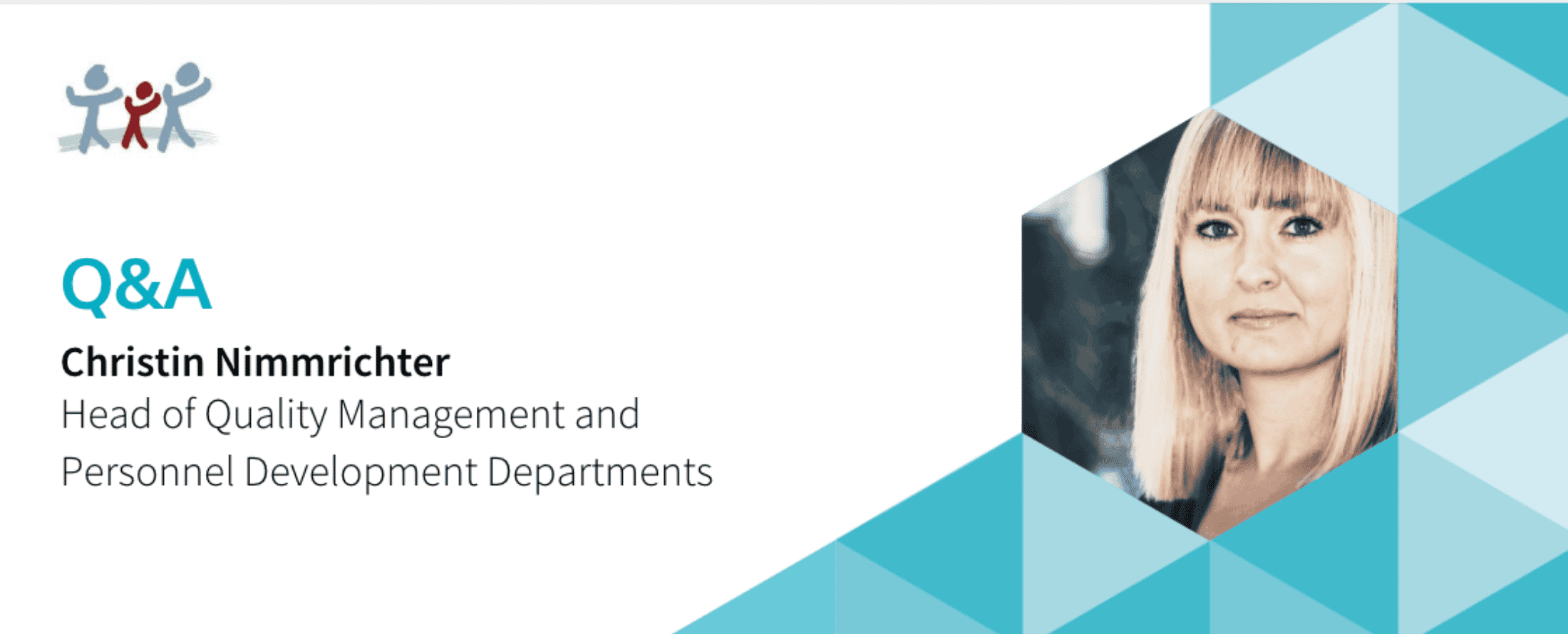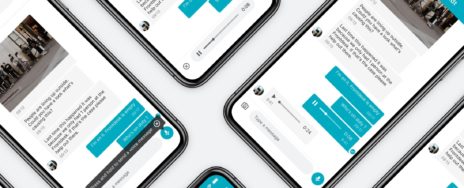With over 200 employees, Mobile Ambulante Pflegepartner GmbH & Co. KG – Münchner Kindl provides intensive outpatient care for children and young people. Founded in Munich in 1991 by Stephanie Müller, children’s nurse and graduate nurse, it was one of the first children’s nursing services in Germany.
In outpatient intensive care, employees always work in a 1:1 care setting in an offsite location such as a school, or at home. Because of the highly mobile nature of outpatient care, in-person contact with supervisors and co-workers is rare. But these field workers need a reliable, secure way to communicate with each other about patient care. The answer is in mobile messaging.
To learn more about how Mobile Ambulante Pflegepartner GmbH & Co. KG – Münchner Kindl has tackled this unique communications challenge, we sat down with Christin Nimmrichter, who has been working in outpatient intensive child care for over 10 years.
As Head of the Quality Management and Personnel Development Departments, as well as Data Protection Officer of the company, she is responsible for (among other things) ensuring a secure and efficient exchange of information to ensure the best possible patient care.
Here’s what she had to say.
Q: How important is the digital workplace in outpatient care and why?
Our employees are always on the move when providing 1:1 care with our patients, that means they take care of several younger patients and could go their whole shift without direct access to their colleagues or a doctor as one is accustomed to in the clinic. Since there is no shift change or somebody to take over, our employees often complain that they lack closeness and personal contact with colleagues.
Even as a superior, you can only see your employees from time to time during meetings and performance reviews — the rest of the communication happens over email and on phone calls. The digital workplace offers new opportunities to improve communication and cohesion among colleagues. Being able to communicate digitally in real time with colleagues or groups creates an atmosphere of teamwork and collaboration.
Like many other social enterprises, we are still at the very beginning, and the care industry is perhaps lagging a little behind. But I see a lot of potential, because the younger generation of caregivers who follow are accustomed to using consumer messaging platforms like WhatsApp, Instagram or Facebook for personal communication, so they will have similar expectations of professional communication.
Q: Your employees mainly work in outpatient care and are therefore always very distributed locally, what are the challenges in operational communication?
Our little patients are cared for by a team of nursing professionals. They could almost be considered virtual teams, since they hardly ever see each other in person due to the 1:1 onsite patient care. In order to guarantee top-notch nursing care for the patient, a regular exchange of information between colleagues is required.
The nursing documentation, in which the planned and performed nursing care is set out in writing, serves as the central communication tool for this purpose. In practice, however, there is often no time to read the nursing documentation in detail.
Therefore, our employees are dependent on receiving the most important information from previous services in a short and condensed form. Ideally via a channel that reaches the entire team at the same time. In recent years, in particular, our employees’ need for group chats to exchange information and strengthen their sense of togetherness has become greater than ever.
Considering the data protection regulations, this is no easy task, but consumer communication channels such as freemail or WhatsApp are out of the question at this point. A dynamic and user-friendly system is needed to remedy this situation.
Q: How did Mobile Ambulante Pflegepartner GmbH & Co. KG – Münchner Kindl chose Beekeeper as its mobile messaging platform? Were there any special requirements for the new tool?
In addition to our employees’ desire for group chats, our previous communication tools hit their limits last year in terms of data protection. We work daily with highly sensitive personal data that needs to be protected. In addition, the legal regulations are becoming stricter, so we were looking for a legally compliant communication system for our company.
As part of our research, we searched specifically for providers who complied with the new Basic Data Protection Regulation. I came across Beekeeper in an article about the DRK (German Red Cross) and was convinced that it would be the right platform.
Other options would have required team members to get trained to use the tools, which was not necessary for Beekeeper. Since the app is so easy to use, onboarding our team was very easy. It doesn’t feel like a new tool as it is so user friendly and easily accessible to our staff.
Q: How has operational communication changed since the introduction of Beekeeper?
We didn’t introduce Beekeeper in a big rollout, but instead did a pilot program with some of our employees. Even though we were convinced by Beekeeper from the get go, we wanted to test whether the app would actually deliver what we had hoped for.
With Beekeeper, we were not only able to improve internal communication among colleagues and strengthen the sense of togetherness in the last six months, but also optimize our operational processes. In addition to the exchange of information between our employees, it is also extremely important for us managers to reach our employees efficiently and keep them up to date.
Before introducing Beekeeper, written instructions in particular were very labor intensive. Now we can handle the entire process with a confirmation campaign. With one click the documents are sent, and with another click I know which employees have received and read the documents and who has not yet confirmed receiving them.
Sharing interesting technical articles through Beekeeper’s Streams feature enables superiors and employees to share knowledge with others, which encourages professional development among staff.
After the first months with Beekeeper, the feedback from all sides is consistently positive — the communication channels are shorter. The system is intuitive, fun and saves middle management from a lot of extra work. Despite the physical distance between employees, the platform creates a feeling of closeness, because you can get in touch with colleagues quickly.
Q: Which Beekeeper functionalities would you like to implement in the future?
Personnel development is a big topic for us, so we will use the survey option Beekeeper offers to analyze the demand for training. We would also like to expand the range of training materials on the streams and offer video training.
Since Beekeeper is precisely what we were looking for and works well in our day-to-day operations, we will implement the app step by step throughout the entire company. I am already looking forward to many more useful features.




